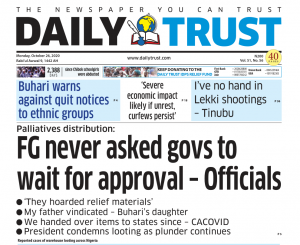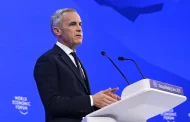This is a time to be reasonable in Nigeria, a time to be patriotic, to beware of anarchists and sponsors of insurrection. Who would choose to be unreasonable and suffer for it when former Heads of State are visiting the seat of power, all the powerful pastors and the few vocal Imams have travelled to Afghanistan or somewhere like that; the radicals and retired radicals have temporarily muted themselves in the interest of peace and national security. It is not everyone who has muted him or herself who did so out of emergency reasonableness. Some have withdrawn from the scene to avoid being caught in the desperate attempt to regionalize the #EndSARS revolt. As few as they are, recognising that looks proper.

Former US president, George W. Bush
What observers are saying is that the massive withdrawal into reasonableness has left President Muhammadu Buhari a national hero, the guardian and defender of the national interest, even in the North where insecurity has been devastating. That is always what happens. Buhari’s fortune has precedence in George Bush Jnr’s in 2011. Here is Sandra Silberstein’s description of the metamorphosis of the then president of the United States:
Through public rhetoric, a rookie president, America’s first appointed president, became popularly accepted as America’s military commander in chief and America’s chaplain. The nation was (re)created and united, with single purpose. The targets of the attacks were established—Western democracy, “our very way of life”—and one of the physical targets, New York, became America’s city. Finally, dissent was discouraged. All of this occurred before a single bomb was dropped on Afghanistan, and all of this happened through words.
Bush was the butt of jokes as an electoral thief before 9/11 occurred. But his choice of words and the sense of fear and danger those words created in the aftermath of 9/11 rallied America solidly behind him subsequently. Professor James Der Derian who was teaching in an American university then tells the story of how he found himself a lone voice at a conference of absolutely well educated American experts when he suggested that Bush’s securitising statecraft was nothing other than that.
It is thus not surprising that the Buhari Presidency has successfully immunized itself against criticism through the manner the president and his cohort of scholars deftly represented the #EndSARS revolt in the language of a national security threat instead of a major signal of a dysfunctional system and a disarranged leadership. Although it took them so long to make up their mind on the strategy of invoking those sentiments in getting the nation behind the government, it also repudiates the action of those who fancy calling this government and Buhari leadership clueless.
It may be an incoherent and inarticulate regime but no less capable of some rudimentary grasp of governmentality or the calculated management of the population through securitising moves. Declining to call the leadership clueless does not ascribe to it any extra ability beyond rudimentary governmentality and Realism of the cheapest brand in the market.
Its clumsy management of a major signal to the system supports such reasoning. A revolt that has shown the Emperor, (the Nigerian establishment as well as President Buhari) to have no clothes on ought to have attracted some more elevated responses based on an elevated threat analysis. No one has seen anything of the sort and no one will see anything under this government. The government is too insecure from lack of moral authority to read the threat beyond its fear of shadows and enemies or the invention of same.
Instead, they will tell you they have solid intelligence as if intelligence itself is anything but a theory: always for someone and for some purpose ala Robert Cox. It is up to the gentlemen with multiple eyes at the DSS to gather their stuff but it is up to a political leader to interpret the intelligence politically. Perhaps, it is possible that the prolonged presence of ex-military elements in the Presidency in Nigeria has robbed the business of ‘reading’ intelligence of the robustness it requires.


Hajiya Sadiya Umar Farouq: paradox all the way down as the claims against her have turned out to be untrue
Otherwise, how would a revolt that everyone can see has brought so much disarray within the establishment as well as the government of the day not receive elevated responses in real time? The disarray is there for all to see in the hasty cessation of hostilities between hitherto fighting former and incumbent Heads of State; the grudging concessions being offered here and there; the securitisation of the challenge to make the generational challenge to autocracy more manageable; the shifting tactics on responsibility over Lekki shooting, (denial today, confirmation tomorrow, silence the next day unend) and the unforgivable epistemic underdevelopment in the insistence on knowing the leaders of the #EndSARS revolt.
Did anybody ask or seek to know who the leaders of the Occupy protesters that made the World Bank meeting in Seattle in 1999 impossible and who have been a thorn in the flesh of the G-8 leaders wherever in the world they chose to hold their annual summit ever since then? Occupy Movement and coalitions have ideologues, tacticians and backers who are in sympathy with the cause they are pursuing but no single soul can claim leadership of that type of political formation in the post Cold War. When it eventually came to Nigeria in a very high minded manner, the government of the day or key actors in it brought pedestrian parameters in narrating it, mobilising religion and hoodlums against it only to turn around and start shouting that hoodlums have taken over. Then these must be glorious hoodlums, even as they are being detained, summarily tried in courts assembled for such purposes and sundry sacrifices.
Peace practitioners would have thought that a deeply flawed system as Nigeria’s would go for a win-win option that can heal. No. Not for this government. Those who dare it must be punished, must be humiliated. Recognition of the social context of crime is weakness. Containment and deterrence are the only forms of power worth demonstrating. Who knows? Something good may also come from being harsh, just as what the glorious hoodlums have done to the image of Hajiya Sadiya Umar Farouq.
It has turned out that she was telling the truth when she said she spent billions on palliatives. It is the governors who, for their own reasons, decided to keep the food items, maybe to re-bag them for sale or to distribute as Christmas gift next December (that has happened in one state according to the Police).
Intervention did not carry any story against her other than claims by actors in the public sphere that this platform reported. This is, therefore, not an apology but a recognition of a paradox of the hoodlums phenomenon Nigeria is contending with.




























